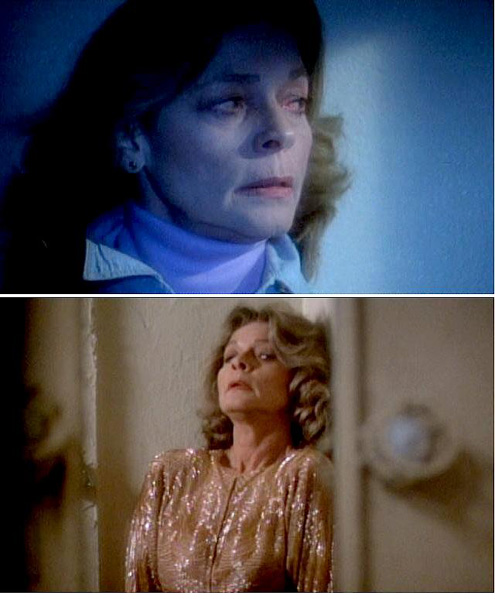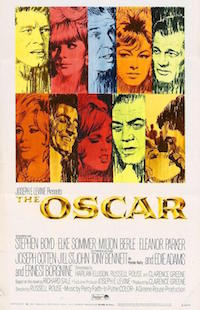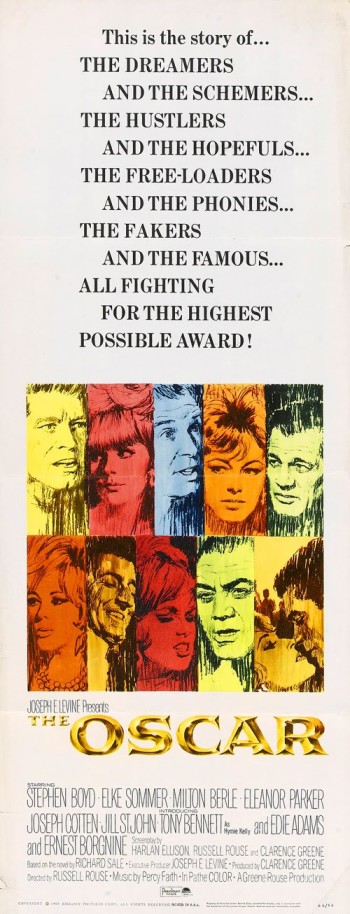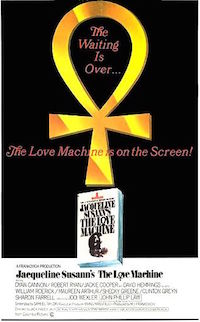 This is the story of a great star and a fan who went too far.
This is the story of a great star and a fan who went too far.
Not to be confused with the Robert DeNiro/Wesley Snipes movie of the same name, The Fan (1981) is a crazy thriller that’s part Torch Song (1953), part Friday the 13th (1980), with a little bit of Cruising (1980) thrown in for good measure.
What it’s all about: If legendary film composer Bernard Herrmann had written the theme to Jaws (1975), then you’d have a pretty good idea of Pino Donaggio’s score for The Fan. As the ominous score plays over the opening credits, Douglas Breen (Michael Biehn) composes a fawning letter to his favorite star.
“I bought a gorgeous new Lucite frame for one of your most famous pictures,” he writes. “I know of all the famous men in your life, but I adore you as no other ever has, or ever will. You are the greatest star of all.”
On the closing night of her latest play, legendary actress Sally Ross (Lauren Bacall) is mobbed by fans outside the theatre. One particularly ardent fan snatches the pen that she is using to sign autographs. Douglas, who is more ardent than most, trips the thief and takes the pen for his own collection.
The next morning, Sally’s household staff awakens her with boisterous birthday wishes. “As of today, I’m going to be forty-five forever,” she declares.
“Forty-nine,” her secretary corrects.
Bacall looks terrific, but even the most adoring fan would have a hard time arguing that she doesn’t look all of her fifty-seven years.
In the tradition of Thelma Ritter in All About Eve (1950), Maureen Stapleton plays Belle, the no-nonsense personal assistant who doesn’t take any crap anybody, let alone from her famous employer. Belle reads all of Sally’s fan mail and politely tries to placate Douglas’ increasingly demanding requests.
Jake Berman (James Garner) who was once Mr. Sally Ross, has lunch with the birthday girl. Sally confides to her ex-husband that she is worried about her next show, her first attempt at a musical. Jake confides that he plans to marry the young woman that he’s been seeing.
Later at home, Belle tells her employer that she’s just had three chocolates. “I’ve had three drinks,” Sally counters. When she asks her secretary about her plans for the evening, she gets a typically sassy response.
“One of your old movies is on. That oughta put me to sleep.”
Douglas has plans as well, demented as they may be. “You interrupted a very wonderful evening,” he tells his sister, “Right now I’m having dinner with a very famous actress. A great star of stage and screen.” Since he’s sitting alone in his apartment, she is rightfully concerned. It’s obvious that her brother has more than a few screws loose.
At her first rehearsal, Sally learns the simplistic choreography for the shows opening number. The moment she opens her mouth to sing “A Remarkable Woman”, the modest rehearsal band is replaced by a pre-recorded studio track. This only draws attention to the fact that Bacall has a very, shall we say, unique vocal style. It seems the only way the filmmakers could make Bacall’s singing palatable was with a full orchestra and lots of reverb.
Meanwhile, Douglas pounds out another letter on his typewriter. “We will be lovers very soon my darling—and believe me—I have all the necessary equipment to make you very, very happy.” Yikes. Not only that, he carefully rehearses a confrontation with his boss in DeNiro “You talkin’ to me?” style. He gets fired but paints himself the hero in a note to his idol. Belle, worried about the obsessive turn his letters have taken, severs all correspondence between Douglas and her employer.
In a new letter to Sally, Douglas writes that Belle must be, “jealous of our relationship. Has it occurred to you that she might have lesbian tendencies?”
In a moment that is sure to leave viewers scratching their heads, Sally balks at the idea of drinking coffee during a rehearsal break and takes one of the dancers down the street to a health food store. The woman drinks like a fish and has the gravelly timbre of a lifelong smoker, yet for some inexplicable reason, she has a problem with caffeinated beverages.
Douglas turns up at the rehearsal hall in an attempt to deliver his latest letter, but is intercepted by Belle. When she shows Sally the latest note from the “weirdo”, the star haughtily pulls rank. “You’re supposed to be my secretary and I don’t pay you to upset my fans!”
“He wants to be your lover for chrissake! What was I supposed to do, give him an appointment?” They quickly end their quarrel with Sally admitting to being a spoiled bitch. “One of the greatest,” Belle lovingly agrees.
Douglas has taken to stalking his prey. One evening, as Belle walks along a deserted subway platform, he attacks her with a straight razor. In the hospital, Jake and Sally stand vigil over Belle, whose face is bandaged up like the Phantom of the Opera. While her employee recouperates, Sally is forced to (horror of horrors) open her own mail! In his latest letter to Sally, Douglas cops to the attack on Belle. “The important thing was to get her out of the way so that we could be together. Soon we’ll be free to express our love—fiercely, openly, over and over again.” Double yikes!
The police are finally called in, but inspector Hector Elizondo has very little to go on. The previous letters were thrown away and Douglas stopped putting his return address on the envelopes. In the days before forensic science, it was so much easier to be a predatory psychopath.
When Douglas sees David the chorus boy (Kurt Johnson) give Sally a kiss on the cheek, he follows him to the YMCA. David changes into his Speedo and hits the pool for a few laps. Douglas slips beneath the surface of the water and pulls out his straight razor. As David swims past, he slices him open.
“My dearest darling,” he writes, “Once more I have proven my love. I am ready to do it again and again.”
“He’s after me now. Isn’t he?” Sally asks the inspector. Despite the threat to her life, the show must go on. The pressure starts to get to her at a dress rehearsal where, after flubbing a dance step, she storms off the stage.
In her dressing room, Sally lets loose to her ex-husband about all that is wrong with the show, which she refers to as a “masochistic little adventure”. Masochistic to whom? Her, or the audience that will have to pay to see it? “My secretary has been attacked, and now David,” she fumes. “And, oh yes, just a minor detail, there’s some freak out there who wants to kill me.”
Elizondo, who is perhaps trying to prevent undo harm to New York theatergoers, suggests that Sally let her understudy perform the previews. It’s a no go. Sally is a trouper. Douglas is somehow able to gain entrance to Sally’s apartment and ambush her maid. When Sally arrives home, she finds that her housekeeper has been killed and her penthouse has been trashed. A new note reads: “Dearest Bitch, I’ve exhausted myself trying to think of the perfect way to kill you.”
Sally goes into hiding. At her beach house she smokes, drinks and frets over things that go bump in the night.
What’s a cuckoo to do when the object of his obsession skips town? Hit the nearest gay bar, of course. Douglas picks up a handsome young guy and brings him home. On the rooftop of his building, Douglas whips it out… his razor, that is. He slits the poor guys throat, douses him with gasoline and sets him on fire. Douglas leaves a suicide note nearby, “Let my burning body be a monument to the great love that might have been.”
With her stalker now a pile of ash, Sally returns to New York and the show. On opening night, Garner resolves his character’s tepid subplot. He’s sent his bimbo packing and is ready to commit to Sally, a real woman.
Curtain up. Light the lights. As Never Say Never begins, it’s apparent that this is one faux show that will go down in cinema history as one of the tackiest ever committed to celluloid. Dancers in sequined costumes shimmy across the neon-lit stage as a fog machine works overtime. In the middle of it all is Bacall, who croaks out the gonzo show tunes courtesy of Marvin Hamlisch and Tim Rice. During one number, she sits center stage on a giant bed while shirtless chorus boys cavort around her. In a brief backstage moment, the camera zooms in on a dancer who sets a riding crop on the prop table. Gee, do you think that will be important later on?
Douglas, who seems to have spent the last couple of hours carefully grooming himself at home, arrives in time for the show’s big finale. After seeing what we’ve seen so far, who can blame him for waiting till the end to take his seat. In a black sequined pantsuit, Bacall proudly puffs on a cigarette before launching into the nutty showstopper, “Hearts, Not Diamonds”. From the thunderous audience applause, it seems that Sally and the show are a smash hit. Later, after all her well-wishers have gone, Sally changes into something more glamorous for the big opening night party. Douglas has traded his razor for a penknife and quickly disposes of the remaining backstage help so that he can have Sally all to himself.
When it comes to thriller finales, there’s nothing quite as satisfying as watching a diva, in full designer eveningwear, being chased by a maniac. The Fan pays off big time as Douglas pursues his ladylove who is swathed in Halston couture. Sally grabs the riding crop (ah-ha!) and manages to get one good smack in before being chased out into the empty auditorium. “I never wanted to hurt you Sally,” he tells her, using the crop to punish the aging star.
Sally, it seems, has had enough. “You’re pathetic,” she growls as he backs her up against the stage. Brandishing his weapon, she remains unintimidated, “Well, I’ve had it. I will not be a victim.”
Douglas can’t bear it any longer and collapses into her arms. “Please love me,” he begs. Seizing the opportunity, Sally takes the knife and stabs him in the jugular. In what may be the single most horrifying moment in the entire film, the camera captures a close-up of Bacall’s eyes. Baggy, bloodshot and as wrinkly as grandma Moses, it’s hard to believe that a shot so unflattering could have made it into the final cut.
Douglas sits in an aisle seat, stone cold dead, an audience of one. Sally slowly walks up the aisle and out of the theatre. After all, she has an opening night party to attend. She wouldn’t want to disappoint her fans.
In conclusion: The deliciously awful Broadway spectacle featured in The Fan is, in no small part, thanks to Bacall and her husky baritone. As insane as the prospect of Bacall singing for a paying audience might seem, she did in fact star in a Broadway musical, not once, but twice! First came Woman of the Year, and later, Applause, a musical based on All About Eve. It just goes to show that truth is often stranger than fiction.
One issue that The Fan never seems to resolve is the question of Douglas’ sexuality. Is he gay or is he straight? He’s undoubtedly a showtune queen, fastidious about his appearance and knows his way around a gay bar. These are the classic traits of a Hollywood homo, but several references are also made to his desire to bed Sally. Perhaps the filmmakers added this tissue paper thin pretense of heterosexuality as a way to get audiences to believe that his character could desire a woman old enough to be his grandmother.
One thing, however, proves that Biehn’s character was unquestionably straight. In several instances, Douglas refers to Sally in his letters as “Miss Ross”. As any gay man knows, there is only one true Miss Ross, and Lauren Bacall ain’t it.










